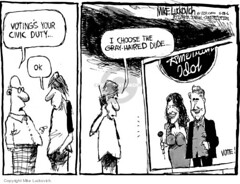The engaged citizenry and voting or why you should stop buying clothes from The Gap
I have to admit I fully don't understand Home Rule in DC. One of the things in the charter, is that citizens cannot vote on budget matters, I guess because of separation of powers. It means that DC residents do not vote on bond issues and the like, unlike in most other jurisdictions.
So while I mentioned that pro-transit vote in Charlotte, NC, there were many other transit and planning matters on the ballot this week. Some were steps forward, such as the land use Measure 49 in Oregon (see the AP story "Properties affected by Ore. land use law") and in other places transit lost. In some places, it's hard to say if the vote was good or bad, e.g., in Seattle, a transit and roads measure failed, even though it was about 2/3 for transit funding, because a goodly number felt the proposal was overly road-oriented (see the AP story, "Seattle metro voters reject roads-transit tax plan").
San Francisco, which has a strong role for citizens and citizen-initiated initiatives within their political system, had a couple of transportation matters on the ballot this week. From "Early results: S.F. voters want to help improve transit system" in the San Francisco Chronicle:
San Franciscans may gripe about a lack of parking and the unreliable municipal public transit system, but early results from Tuesday's election suggest that voters still support the city's long-standing policy of promoting alternatives to driving.
With ballot tabulations continuing to come in Wednesday, Proposition A remained ahead. The measure would provide the Municipal Transportation Agency with more money and management tools aimed at improving the city's transit operation.
It would also retain limits on the creation of parking spaces. Proposition H, which would pave the way for considerably more off-street parking in the city, was still trailing....
A politically potent coalition of environmentalists, transit advocates and organized labor, along with endorsements by Mayor Gavin Newsom and a majority of the Board of Supervisors, backed the campaign in favor of Prop. A and opposed Prop. H. On the other side were the San Francisco Chamber of Commerce, the San Francisco Republican Party and Gap founder Don Fisher, who helped bankroll Prop. H and the campaign against Prop. A.

Photo by Justin Sullivan/Getty Images.
The battle had a series of subplots focused on personal grudges and political ideology, but there were also far-reaching policy implications: Voters had to decide whether they wanted to do more to help Muni - the Bay Area's busiest transit system that provides close to 700,000 rides a day - or to create more parking, which transit planners argued would encourage more people to drive.
"One of the problems with (Prop.) H is it would have added tens of thousands of new cars to city streets. The added congestion is a real issue. Just adding more spaces without addressing congestion and the public transportation needs would be a disaster," said Supervisor Sean Elsbernd, who represents the city's more conservative westside neighborhoods.
Prop. A would funnel at least $26 million more a year into Muni and give the directors and administrators who run it more autonomy. Management would have greater say over personnel and finances.

Mike Luckovich editorial cartoon.
Labels: civic engagement, transportation planning, voting and referendums



0 Comments:
Post a Comment
<< Home